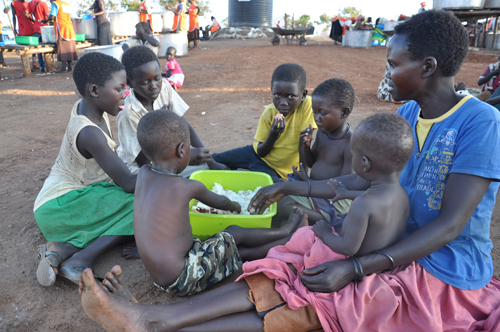
MOSES MUKITALE, of World Vision UK, says the situation facing South Sudanese children forced to flee their homes to neighbouring countries like Uganda demands a greater response from the international community right now…
Their questions are relentless. The children I meet nearly every day are desperate for answers.
“Moses, shall we ever leave this camp? Moses, will we ever see our parents again? Moses, will we have enough food next month? Moses, I need books. I want crayons. I want shoes.”

MORE ACTION NEEDED: Recent South Sudanese refugees in northern Uganda. World Vision is the UN lead agency handling food and non-food items, preparing hot meals for all new arrivals, distributing high energy biscuits, and distributing dry rations as well as providing protection for children. PICTURE: World Vision.
“Life for refugee children from South Sudan is heartbreaking. Some have witnessed their parents murdered in cold blood. Others recount horrific experiences of sexual assault or watching their family members being kidnapped.”
One boy even asked me about how his English premiership football team Arsenal, are doing. He last watched an Arsenal game two years ago, he tells me. I told him that they won the FA cup and he rejoiced.
Life for refugee children from South Sudan is heartbreaking. Some have witnessed their parents murdered in cold blood. Others recount horrific experiences of sexual assault or watching their family members being kidnapped.
I watch hundreds of grief-stricken refugees arrive in Uganda everyday. There are women who clutch babies to their chest, children without shoes never imagined that one day they would be ferried on cattle trucks to a refugee settlement.
There are now one million South Sudanese refugees in Uganda. They never asked to sleep under plastic roofing sheets. They never asked to walk for weeks fleeing their homes and communities.
They had big dreams and hopes for better education, good families, good neighborhoods, proper health care and to live happily ever after. But those hopes are now in the past.
My friends from other parts of the world are in disbelief when they see the situation for themselves.
“Donor fatigue,” they explain to me when I ask why more isn’t being done to help the refugees. This phenomenon means people no longer donate to charitable causes, although they have done so in the past.
But how about for causes like the South Sudan refugee crisis where donations are scarce? Is that fatigue or simply choosing to close one’s eyes to the cries of innocent people?
It’s also been explained to me that people do not like to donate to politically motivated crises, that they would rather channel their assistances to victims of natural catastrophes.
Still, donors are forgetting something fundamental: all calamities are catastrophic regardless of their cause. The only difference comes in context.
None of people from South Sudan ever took part in a vote to flee their homes. They ran because they had no choice, they feared their life would end if they remained in South Sudan.
Last week, 16-year-old Grace confronted me.
“Until when shall we get this little food? It’s not enough. You keep telling me that soon we shall be able to get enough food to eat. When will that be?”
Grace and other children are running out of patience. They have been promised over and over that things are going to get better. When I meet them, I offer apologies and words of encouragement. Words are not enough though.
“Grace and other children are running out of patience. They have been promised over and over that things are going to get better. When I meet them, I offer apologies and words of encouragement. Words are not enough though.”
Uganda opened its doors to their neighbours and welcomed refugees to our country. It was and still remains a reflex action, an act of love and kindness from the Ugandan government. Still, we can’t do it alone.
Other governments have promised to assist. In June, Uganda and the UN appealed for $US2 billion to support the country’s total refugee caseload of 1.3 million for the next four years. Just $US350 million has been raised.
We’re told that the other nations are debating “whether it is necessary to welcome refugees plus to cater for their needs.”
We cannot wait. South Sudanese refugees continue to arrive by the cattle truck full every day. We cannot choose to close our eyes to the cries of innocent suffering people.
“No one has ever become poor by giving.” Anne Frank once said.
Moses Mukitale is a communications coordinator with international charity World Vision, who is currently supporting the organisation’s response to the South Sudan refugee crisis in northern Uganda. This article was first published by the Thomson Reuters Foundation.





